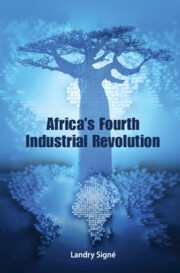Book contents
- Africa’s Fourth Industrial Revolution
- Africa’s Fourth Industrial Revolution
- Copyright page
- Contents
- Figures
- Tables
- Foreword
- Preface
- Acknowledgments
- 1 Introduction
- 2 What Is the Fourth Industrial Revolution?
- 3 What Does the Fourth Industrial Revolution Mean for Africa?
- 4 Drivers of and Challenges to the Fourth Industrial Revolution in Africa
- 5 Capitalizing on the 4IR in Africa in the Primary and Secondary Sectors
- 6 Capitalizing on the 4IR in Africa in the Tertiary Sector
- 7 Leaders in the Fourth Industrial Revolution on the African Continent
- 8 Emerging Leaders in the Fourth Industrial Revolution on the African Continent
- 9 The Imperative of Cybersecurity during the Fourth Industrial Revolution
- 10 The Importance of Health Care and Technological Innovations during the Fourth Industrial Revolution
- 11 Conclusion
- References
- Index
Foreword
Published online by Cambridge University Press: 08 June 2023
- Africa’s Fourth Industrial Revolution
- Africa’s Fourth Industrial Revolution
- Copyright page
- Contents
- Figures
- Tables
- Foreword
- Preface
- Acknowledgments
- 1 Introduction
- 2 What Is the Fourth Industrial Revolution?
- 3 What Does the Fourth Industrial Revolution Mean for Africa?
- 4 Drivers of and Challenges to the Fourth Industrial Revolution in Africa
- 5 Capitalizing on the 4IR in Africa in the Primary and Secondary Sectors
- 6 Capitalizing on the 4IR in Africa in the Tertiary Sector
- 7 Leaders in the Fourth Industrial Revolution on the African Continent
- 8 Emerging Leaders in the Fourth Industrial Revolution on the African Continent
- 9 The Imperative of Cybersecurity during the Fourth Industrial Revolution
- 10 The Importance of Health Care and Technological Innovations during the Fourth Industrial Revolution
- 11 Conclusion
- References
- Index
Summary
The world is at a crossroads, with a new technological era that is fundamentally changing the way we live, work, and relate to one another. This Fourth Industrial Revolution, a term I first coined in 2015, is characterized by new technologies that are fusing the physical, digital, and biological worlds and offer both great potential and great peril to societies as they drive structural transformation to systems of global production, labor, governance, and beyond. In today’s interconnected world, no country or industry can avoid feeling the direct or indirect repercussions of technological development. The question for states, firms, and individuals is not whether to participate in the Fourth Industrial Revolution, but how to manage its enormous opportunities for growth and the troubling risks posed by immense market disruption and structural transformation. The pace and unpredictability of innovation during the Fourth Industrial Revolution will be unprecedented; these changes will force public and private sector stakeholders to adapt rapidly or risk falling behind. Although extensively studied since the publication of my book entitled The Fourth Industrial Revolution, little work has been done to better understand Africa’s role in the Fourth Industrial Revolution. This is why I have welcomed the opportunity to write the foreword for one of the World Economic Forum’s Young Global Leaders, Professor Landry Signé’s pioneering book, Africa’s Role in the Fourth Industrial Revolution: Riding the World’s Biggest Wave of Disruptive Innovation. In this book, Professor Landry Signé examines what defines the Fourth Industrial Revolution and its key technological components, drivers, and global implications. He forecasts Africa’s participation in the Fourth Industrial Revolution by analyzing consumer and industry trends shaping the continent and countries which are leading the way, evaluating specific opportunities, risks, and strategies for Africa presented by the Fourth Industrial Revolution. He provides guidance for government, business, academic, and civil society leaders to help capitalize on the Fourth Industrial Revolution and maximize returns from deploying new technologies. His book presents the duality of the Fourth Industrial Revolution to leaders across the African continent, as both an opportunity for leapfrogging and a risk of falling even further behind. Overall, Professor Signé demonstrates that the Fourth Industrial Revolution offers an unparalleled opportunity to address many of Africa’s key challenges and can help catalyze the continent to unite if governments, business, academic, and civil society leaders can work together to harness this potential. This book will change the way you see Africa’s transformation and potential in the Fourth Industrial Revolution. Everyone, especially leaders interested in understanding how the Fourth Industrial Revolution is changing the developing world and how policy and business leaders can shape it to capture its dividends and mitigate its risks, must read this book.
- Type
- Chapter
- Information
- Africa's Fourth Industrial Revolution , pp. ix - xPublisher: Cambridge University PressPrint publication year: 2023



